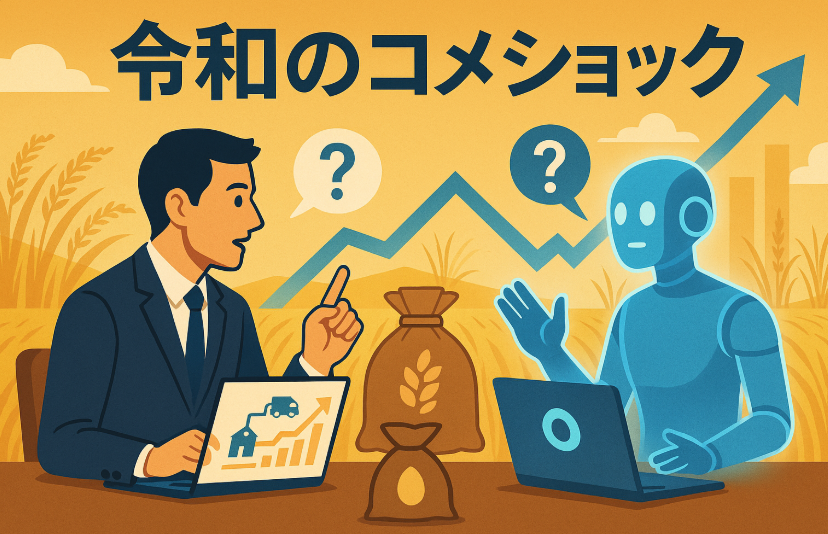時事ニュースで学ぶ!ビジネス英会話 (Page 1/5)
テーマ: 令和のコメショック – The Reiwa Rice Shock
Key Vocabulary
- Soaring prices: The cost of rice is increasing rapidly. (価格高騰: 米のコストが急速に上昇していること。)
- Staple food: A main food that is eaten regularly in a community. (主食: あるコミュニティで日常的に食べられている主要な食品。)
- Supply chain disruption: Problems that interrupt the normal flow of goods. (供給網の混乱: 商品の正常な流れを妨げる問題。)
- Consumer behavior: How people choose and buy products. (消費者行動: 人々が商品をどのように選び、購入するか。)
- Food security: Having reliable access to a sufficient quantity of affordable, nutritious food. (食料安全保障: 手頃な価格で栄養価の高い食料を十分に、安定して入手できること。)
Example Dialogue
Kenji:
Have you seen the news? The soaring prices of rice are unbelievable. It’s our staple food!
ニュース見た?米の価格高騰、信じられないよ。僕たちの主食なのに!
Yuki:
I know. They say it’s due to supply chain disruption caused by bad weather. It’s really affecting my consumer behavior; I’m buying less now.
ええ。悪天候による供給網の混乱が原因だって。私の消費者行動に本当に影響が出てるわ。今は買う量を減らしてるの。
Kenji:
Exactly. This makes me worry about Japan’s overall food security.
その通りだね。日本の全体的な食料安全保障が心配になってくるよ。
Discussion Questions
- How have the soaring prices of rice affected your personal budget? (価格高騰は、あなたの個人的な家計にどのような影響を与えましたか?)
- Do you consider rice an essential staple food in your daily diet? Why or why not? (あなたは自分の日常の食事において、米は不可欠な主食だと考えますか?それはなぜですか?)
- Have you changed your consumer behavior regarding rice or other foods recently? (最近、米や他の食品に関するあなたの消費者行動に変化はありましたか?)
- What was your first reaction when you heard about the rice price increase? (米の価格上昇について聞いたとき、あなたの最初の反応は何でしたか?)
- Do you think the government is doing enough to ensure food security for its citizens? (政府は国民の食料安全保障を確保するために十分な対策を講じていると思いますか?)
- Besides rice, what other food prices have you noticed increasing? (米以外に、価格が上昇していることに気づいた食品はありますか?)
- How does the issue of supply chain disruption make you feel about the future? (供給網の混乱の問題は、将来についてあなたをどのような気持ちにさせますか?)
- Have you considered buying cheaper brands or imported rice? (より安いブランドや輸入米の購入を検討しましたか?)
- What kind of impact does this situation have on an average Japanese family? (この状況は、平均的な日本の家庭にどのような影響を与えますか?)
- Do you talk about rising food prices with your friends or family? (友人や家族と食料品の価格上昇について話しますか?)
- How important is domestic rice to you compared to imported rice? (あなたにとって、国産米は輸入米と比べてどのくらい重要ですか?)
- What are some simple ways consumers can save money on food? (消費者が食費を節約するための簡単な方法には何がありますか?)
- Do you feel anxious about the stability of Japan’s food supply? (日本の食料供給の安定性について不安を感じますか?)
- In your opinion, who is most affected by these rising prices? (あなたの意見では、この価格上昇によって最も影響を受けるのは誰だと思いますか?)
- Do you think this problem will be resolved soon? (この問題はすぐに解決すると思いますか?)
- Have you seen any stores limiting the amount of rice a person can buy? (一人あたりの米の購入量を制限している店を見たことがありますか?)
- How does this news influence your trust in the food market? (このニュースは、食品市場に対するあなたの信頼にどのように影響しますか?)
- What are the emotional impacts of worrying about food security? (食料安全保障について心配することの感情的な影響は何ですか?)
- Would you be willing to pay more to support local rice farmers? (地元の米農家を支援するためなら、より多くのお金を払う意思はありますか?)
- What is one thing you learned about the food supply chain from this experience? (この経験から、食品の供給網について学んだことは何ですか?)

